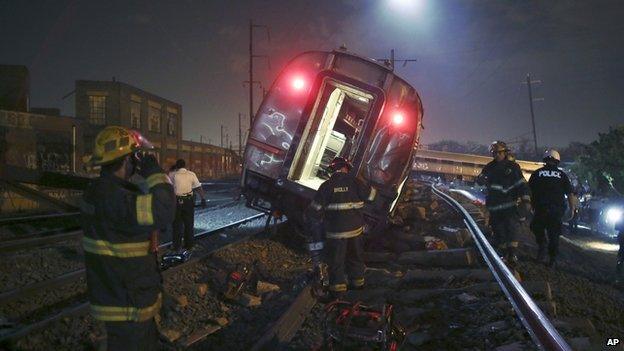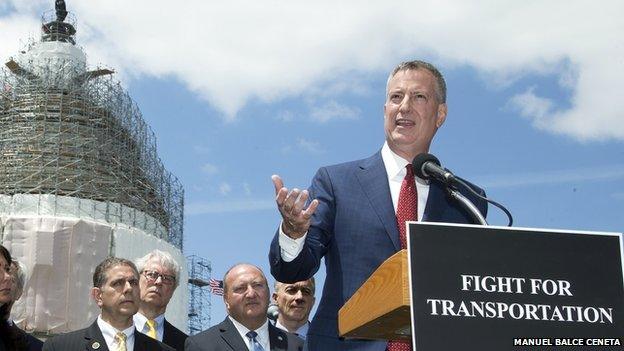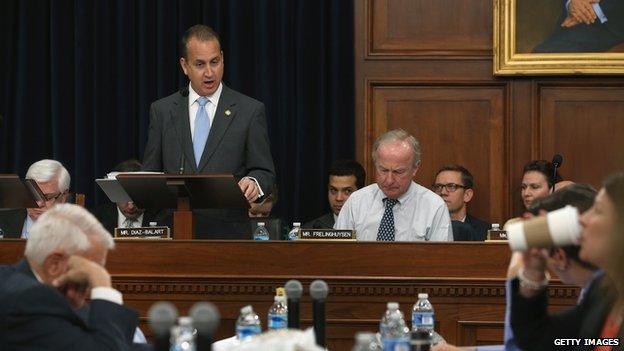'Killers' and 'Ghouls': Amtrak disaster becomes yet another political football
- Published

It's become a familiar routine following a national tragedy. After - or sometimes even before - the shock has worn off, the political debate begins. And it quickly gets ugly.
Such was the case in the hours after Tuesday night's fatal Amtrak derailment in Philadelphia.
The focus of discussion was on congressional funding of the Amtrak system, which receives $1.4bn (£890m) a year from the US government to operate passenger trains across the nation. Year in and year out, Amtrak loses money - estimated at around $230m a year.
Some commentators were quick to argue that the crash could be a result, external of the inadequate amount that the US Congress allocates to the rail service.
"The system has been underfunded for years, and federal legislation requires it to use the revenue it generates in the busy north-east corridor (where most of its riders are) to subsidise operations on the rest of its network, which lose money," writes, external Vox's Joseph Stromberg. "This has led to deteriorating track conditions in the north-east (Amtrak trains ride on tracks owned by freight companies elsewhere), even as passenger numbers steadily climb. It's impossible to say for sure, but this may have played a role in Tuesday's derailment."
The issue was put in particularly stark relief given that a Republican-controlled House committee was voting to cut $260m from Amtrak's 2016 budget on Wednesday. It was something many on the left were quick to point out.

New York City Mayor Bill De Blasio calls for increased federal infrastructure spending
"Congress is guaranteeing more dysfunction and more breakdowns in the system as maintenance costs rise," writes, external ThinkProgress's Aviva Shen. "Those breakdowns can range from creating minor inconveniences, like being 20 minutes late to work, to potential catastrophes, like Tuesday's derailment."
Within 24 hours, the left-wing activist group the Agenda Project had released a video, external featuring footage of the crash and its victims, with the tagline "Republican cuts kill".
The group is asking for contributions to air the spot in the districts represented by Republicans on the House appropriations committee.
"It is high time someone points to the real human costs of this kind of irresponsible governance," they write. "The egregious and utterly unnecessary cuts to Amtrak prevented vital upgrades to our aging railways and crippled the system that transports more than 30 million American citizens each year."
Another target of opportunity was US spending on infrastructure as a whole, which compares unfavourably with other nations. Numbers were provided by New York Mayor Bill De Blasio and Oklahoma City Mayor Mike Cornett in a New York Times opinion column, external that, coincidentally, was published on Wednesday.
The US currently commits 1.7% of its gross domestic product on infrastructure spending - money for things like roads, rails, bridges and airports. China, by contrast, spends 9%; Europe comes in at 5%.
Mr De Blasio took the opportunity to tweet out links to his piece after the crash with words of caution, external: "Congress must increase the federal transportation infrastructure investment to keep us safe."
Those views were echoed in Congress on Wednesday, as Democrats made statements calling for a boost in federal spending.
"We are not close to where we need to be for our roads, highways, bridges, transit and inter-city passenger rail," Democratic Senator Tom Carper of Delaware said, external. "We are just fairly miserable at that - and not just the ability to move people where they need to go when they need to go, but also to ensure our safety. We've got to do a better job, and last night's train tragedy is just a grave reminder of that."
All this had conservative commentators up in arms, accusing their liberal counterparts of taking advantage of a tragic event.

A congressional committee approved cuts to Amtrak funding on Wednesday
"Before the dead were counted and the facts known, the craven, partisan ghouls in our mainstream media were already using a terrible domestic tragedy to call for more government spending," writes, external Brietbart's John Nolte.
Interspersed with these critiques, however, were boilerplate attacks on Amtrak as just another example of big-government waste and mismanagement.
"Lying amid its own ruin, Amtrak 188 may be regarded as a tragedy, a symbol, or a cautionary tale, but it cannot legitimately be another excuse for throwing more good money after one of America's worst companies," writes the editors of the Washington Examiner. "Amtrak is a government-run money-losing machine with appalling management practices that would never fly in the private sector."
It wasn't long before the accident became a grab-bag for anyone looking for a way in to push their own political agenda. An opportunity for Donald Trump to tout his business acumen? Sure., external A way to advance an energy policy agenda? Why not.
"Amtrak's killed more people than fracking," tweets, external Erick Erickson, editor of the conservative Red State blog. "Guess which one the left wants to subsidize."
The conservative outrage set off another round of counter-accusations.
"Republicans dismissed the claims that a lack of funding had any affect on the derailments and even accused Democrats of using the tragedy as an opportunity to further an agenda for ... safer infrastructure, I guess," writes, external Ashley Feinberg. "How dare they?"
There's a famous psychological paper that outlines the stages of grief, external - denial, anger, bargaining, depression and finally acceptance.
The political world, it seems, has its own version - shock, finger-pointing, outrage over finger-pointing, indignation over the outrage, and on and on.
It almost never ends in acceptance and solutions, not in today's US political arena. Eventually the participants just move on - until the next disaster hits.